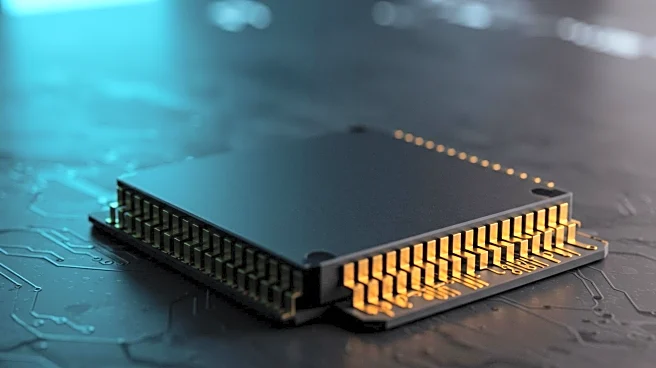What's Happening?
The Trump administration has announced a significant investment in Intel, acquiring a 10% stake in the company. This move, however, does not involve new funding but utilizes previously awarded grants. The $8.9 billion investment is sourced from $5.7 billion allocated under the Biden administration's CHIPS Act and an additional $3.2 billion from the Secure Enclave program. President Trump, who has criticized the CHIPS Act, described the acquisition as a beneficial deal for both the United States and Intel. Despite his previous criticisms, Trump praised Intel CEO Lip-Bu Tan for negotiating the deal. The investment is characterized as passive, with no board seats or governance rights for the government.
Why It's Important?
This development is significant as it highlights the U.S. government's strategic interest in bolstering domestic semiconductor manufacturing, a critical industry for national security and technological leadership. The investment in Intel, a major player in the chipmaking sector, could enhance the company's capacity to innovate and compete globally. However, the use of pre-allocated grants rather than new funds raises questions about the flexibility and intent of the CHIPS Act. Legal challenges may arise regarding the conversion of grants to equity, potentially impacting future government-industry collaborations. The move also reflects ongoing political dynamics, with President Trump leveraging existing policies to advance his administration's economic agenda.
What's Next?
Potential legal challenges could emerge concerning the legality of converting CHIPS Act grants into equity stakes. Stakeholders, including lawmakers and industry experts, may scrutinize the implications of this investment strategy. Intel's future actions, particularly in terms of technological advancements and market positioning, will be closely watched. The administration's approach may influence future policy decisions regarding government investments in critical industries. Additionally, the response from other semiconductor companies and international competitors could shape the broader landscape of the global chip market.
Beyond the Headlines
The investment underscores the complex interplay between government policy and corporate strategy in the tech sector. It raises ethical and legal questions about the use of public funds for private equity stakes. The decision may set a precedent for how government support is structured in strategic industries, potentially influencing future legislative and regulatory frameworks. The focus on semiconductor self-sufficiency aligns with broader geopolitical trends, as nations seek to secure supply chains and reduce dependency on foreign technology.









